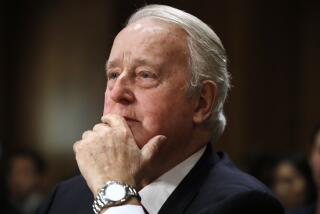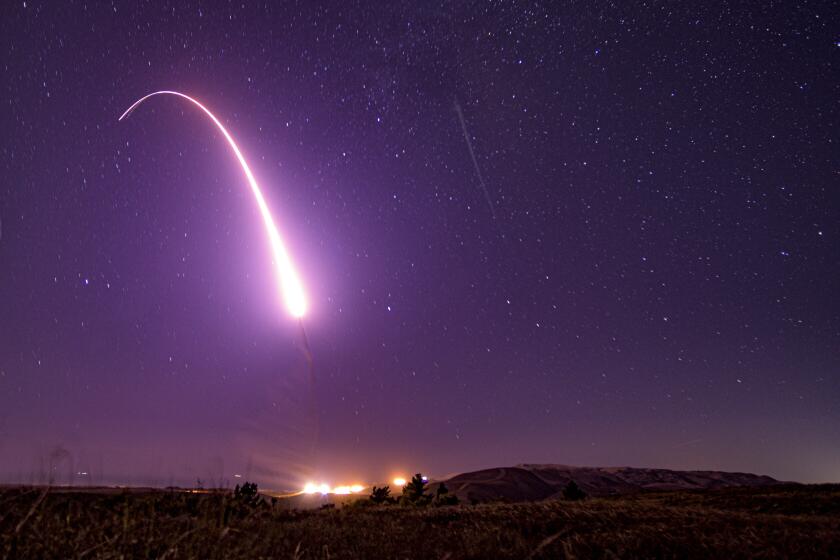Media : ‘A Long Day for Canada’: On the Death of the Meech Lake Accord
- Share via
Here is a sampling of Canadian editorial comment on the demise of the Meech Lake Accord.
The references to “rolling the dice” in the editorials stem from a highly damaging interview Prime Minister Brian Mulroney gave Canada’s national newspaper, the Globe and Mail, on June 11, just two days after Mulroney and Canada’s 10 provincial premiers had concluded a week of arduous talks about the Meech Lake Accord.
In the interview, Mulroney left the impression that he had scheduled the talks so as to exert the maximum possible pressure on three provincial premiers who were refusing to sign the accord. His words were, “It’s like an election campaign. You’ve got to work backwards. You’ve got to pick your dates and you work backward from it . . . . I said (to my aides) that’s the day that I’m going to roll all the dice. It’s the only way to handle it.”
This statement has come to symbolize a perception in Canada that, rather than trying to amend the national constitution in a high-minded, statesmanlike manner, Mulroney was coming up with tricky schemes to manipulate the premiers into doing his bidding.
“Actions have consequences, as Prime Minister (Brian) Mulroney and Quebec Premier (Robert) Bourassa somberly reminded the country yesterday (Friday).
“The morbid consequences to the nation of the killing of the Meech Lake Accord by two small provinces are already being felt. The most predictable--warnings which some premiers apparently never took seriously--is that the political future of Quebec in Canada is more than ever an open question. . . .
“The country of Canada, as Mr. Bourassa puts it, is once again just a “legal” country, instead of the “real” country he said it would be for Quebec if Meech Lake had been accepted.
“The premier of Quebec is reacting honorably to a terrible blow from two premiers (Clyde Wells of Newfoundland and Gary Filmon of Manitoba) who stopped Canada in its constitutional tracks. The challenge for Canadians who like their country whole is to do everything they can, as quickly as they can, to make this a real country for Quebecers.”
From the Montreal Gazette, the leading English-language daily in Montreal.
”. . . June 22 will go down in history as the longest day in the history of Canada. Hour by hour, minute by minute, the descent into hell of the Meech Lake Accord shook the political and journalistic world, until the final judgment of Senator Lowell Murray and of (Quebec) Premier Robert Bourassa: The accord is dead.
“A long day, but also a day of dupes for those Canadians who believed in the intellectual honesty of a certain part of the political class. The word given, the signature at the bottom of a document, the honor of a government--all this was meaningless in certain circles.
“It was an obvious betrayal by (Newfoundland Premier) Clyde Wells, on the one hand, of the agreement he signed in Ottawa at the beginning of this month, to do everything possible to bring about the return of Quebec to the constitutional family in an honorable way . . . .
“Bourassa has laid out the facts, in his brief and brutal declaration made before the (Quebec legislature): “Quebec will always be a distinct society, free and capable of carrying out its own destiny and development.” Let English Canada understand and reshuffle its cards . . . . “
By Raymond Giroux, in Le Soleil, of Quebec City, the capital of Quebec.
“Yesterday, Prime Minister Brian Mulroney rolled the dice one more time. This time, Canada lost.
“After a day of duplicity and deceit, Federal Provincial Relations Minister Lowell Murray pronounced the Meech Lake constitutional accord dead.
“Moments later, a shocked nation watched on television as Premier Robert Bourassa declared Quebec “a distinct society” capable of forging its own destiny . . . .
“It was Mulroney’s cynical strategies that finally killed the deal, leading up to Bourassa’s dramatic appearance in the Quebec National Assembly last night. If there is still a way out of this quagmire, it will take far more leadership than this Prime Minister has ever shown.”
From Saturday’s Toronto Star
“The Brian Mulroney Canadians watched on their television sets this weekend was a humbled, saddened man delivering a statesmanlike speech about the failure of the Meech Lake Accord . . . .
“But this is not the only Brian Mulroney. After six years of his leadership and three tortuous years of attempts at constitutional reform, Canadians now know that the prime minister has two sides.
“That second Brian Mulroney is the man we recently saw boasting about his contemptuous gamble, about rolling the dice with the future of this country.
“The Brian Mulroney who spoke to us this weekend is a man Canadians would like to trust and believe, and no longer do . . . .
“Brian Mulroney wanted to be in the history books as the man who unified Canada. His desperation to achieve that distinction led him to dubious tactics, including a cheap last-minute attempt to salvage the accord by playing games with the deadline . . . .
“The statesman we have glimpsed in the past few days could have clinched a deal. But statesmanship has not often enough been Brian Mulroney’s game.”
From Sunday’s Ottawa Citizen, the main English-language newspaper in Canada’s bilingual capital.
“The death of the Meech Lake Accord will have a more profound effect on Canadian unity than the accord itself would have had. The process which led up to the death may have the most profound effect of all.
“There is no doubt that the last three years of constitutional negotiation have done serious damage to the country’s social and political fabric. The process has eroded trust and good will among regions, among politicians and between politicians and the people who elected them. Healing will take a long time. The scar tissue which is left will disfigure Canada for even longer.
“Moderation and good sense, of the type displayed . . . by (Manitoba) Premier Gary Filmon, should help the healing process. But Canadians should not delude themselves that mere expressions of good will can make the country whole again . . . .
“The differences implied by the Meech Lake Accord were relatively modest but, to anybody who clung to the fiction that all 10 provinces are identical and must always behave in identical ways, it was too much. If it remains too much to most Canadians, then the tension between Quebec and the rest of Canada will grow until there is a rupture . . . . “
From Saturday’s Winnipeg Free Press. (Manitoba was one of the two provinces where legislatures adjourned Friday without ratifying the Meech Lake Accord, thus killing the document.
”. . . The Meech Lake adventure has ended in a slough of destructive human relations. In substance, the accord (was) an intelligent, supple and creative accommodation among Quebec, nine other provinces and the federal government. But substance did not carry the day . . . . “Now is not the time for more action; now is the time for a rest. Let emotions subside and the summer allow reflection. Canada has had a serious accident; Canada needs gentle tending more than anything else for now.”
From Saturday’s Globe and Mail, a newspaper that is published in Toronto but has a national scope.
More to Read
Sign up for Essential California
The most important California stories and recommendations in your inbox every morning.
You may occasionally receive promotional content from the Los Angeles Times.










